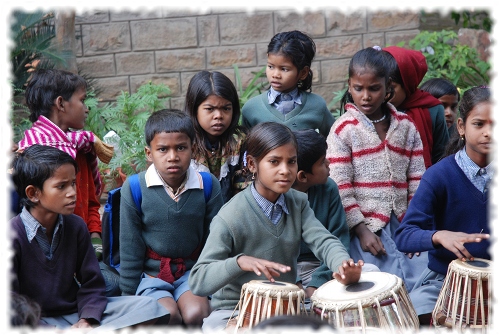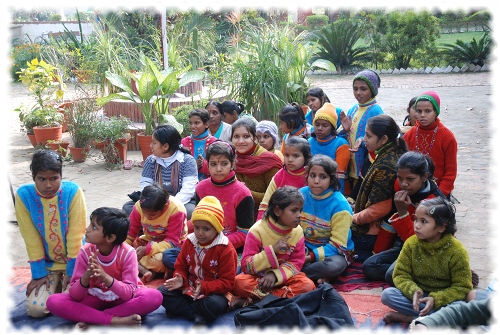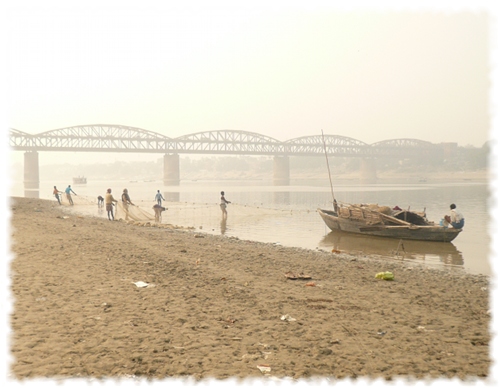Percorso
Happy new year!

Kashi, 3-1-2011
Rain and wind have come with the arrival of the new year. Cold has become definitely more intense (temperature drops till 3-4 degrees Centigrade at night) and even during the day the sun can hardly warm. Sometimes it remains completely hidden behind the grey sky and the mist rising from the river. In Uttar Pradesh (the state-region of Varanasi) many people, especially amongst the oldest ones, have fallen victims of this further drop of temperature.

How nice it is to jump…
On New Year’s day some friends and acquaintances have come to the ashram, giving their greetings in a simple and discreet way. Kids run to you wishing “Happy new year!” with a big smile and shaking your hands. Some bring with them a small envelope for Anil Baba. Inside a few candies, a chocolate and a drawing or an affectionate message for their Baba Ji.

Also the friends of Little Stars School of Varanasi have come to give their greetings. With them there were about twenty girls of their school, all orphans. After having played with the ashram’s games (slide, swings, spinning merry-go-round, etc.) and having eaten some delicious samosas and longlatas (a local sweet), they have joined with some girls of our school who were practising on the tablas. Together they have been singing and playing some bhajans, such as Aghoreshwar Aarti, Shri Guru Paduka Pancakam and Aghoranna Paro Mantro.

Last week kids have been engaged with midyear exams. After this tiring week, Anil Baba wanted to give some distraction and relax to the kids, organizing a day devoted to cooking and not to books.

A large number of mini-kitchen suddenly appeared around the school. Kids brought also some ingredients from home, what was missing was given by the ashram. Split in teams of five, six and even more, they have been working hard till late in the afternoon to cook delicious dishes.

Only after we tasted the dishes and smallest kids had been taking food, they have been sitting to enjoy the fruits of their own work as well. I was very impressed by the utmost seriousness and practicality with which they have been working hard. Skilled mini-chefs. Their practicality comes from the village life.

From childhood, they are used to do several jobs to help their own families. Lighting the fire, bringing the water, picking up cow dung to dry it for the fire, peeling, cutting and washing vegetables, working flour to make chapati (the bread, which is called Roti here), looking after the youngest brothers and sisters, going down to the river to wash the clothes.

Some of the oldest girls (from twelve to fourteen years old), with even four or five younger brothers to be looked after, are real maids and do a real job.
I had a chance to visit the village with some girls of fifth class. I thought to take a brief tour of the village, and then to buy some sweets or samosas for them to eat. In the end, taking me from house to house, they have been offering me chai (tea) and food (samosas, pakawaras, chow meins, biscuits, etc.) in large quantity. They were very excited and happy for having a little bit of attention, and very keen to show me their simple small houses and introduce me to their families. After I visited the first house, Nandani’s place, I couldn’t decline the other invitations nor refuse something to eat. The girls were about ten! We ended our “tour” at another Nandani’s mother’s small tea-shop which overlooks the river bank. Not content, they wanted to accompany me back to the ashram, giving me a nice small white mouse as a present.

Many of their parents do heavy and menial jobs, some of them work outside Varanasi or even outside Uttar Pradesh. They can stay far from home even several months. Someone works at the village as fisherman.

They work several hours a day, sometimes also at night, when the water is a little warmer. On average it takes at least an hour to cast their nets and haul in them back to the bank (time can change accordingly to the season or the conditions of wind and current). It is a very hard work, most of the time they stand knee-deep in water, and often when they haul in the nets to the bank, if season is not one of the most favourable (such as this one), they get a poor basketful of fishes.

Here the river is called Ganga Ji, or Ganga Maa, the Mother Ganga. A great kind Mother who feeds her children living on her banks, and who receive and accompany them even at the moment of their death.
Girls are starting a new class of Kathak dance with a new teacher, a very young dancer. Kathak is one of the classical Indian dances, coming from North India. They have started this new task with great enthusiasm. Then, in this cold, dancing is a very funny way to warm up!

We’ve been going on with the pruning of plants and the maintenance of the garden. Ashram’s residents wanted to have a try with the rope for climbing on trees: Pratap has proved to be the fastest in the ascent, Happy the most professional and attentive and Brahmachari…the funniest one. A day of training spent in great cheerfulness.
Pratap is working to finish off one of the walls at the entrance. He is a very skilled and experienced carpenter, and not only with chisel, bricks and cement. He is also a very good cook (a master in working the flour for the bread) and one day he had a try at making Jelebis, from dough to frying. It is the first time Jelebis have been prepared here, usually they are bought outside the ashram. Result was very good: kids as well as adults have appreciated a lot.

Before leaving I wanted to greet the granny who has come back again to the ashram a few weeks ago. She is a very small old lady (between 80 and 90 years old) who, as she has almost no one helping her at the village, often comes to spend a few months in the peace of the Siddhapeeth. I greeted her and smiling, she said to me: “Go, earn honestly what you need for eating and living and, wherever you are, try to be happy.”

Greetings from Great Mother Ganga
Marcello





